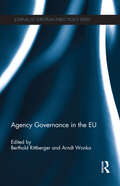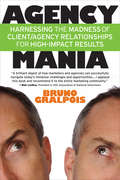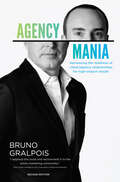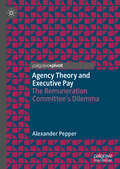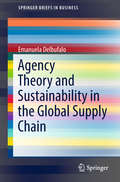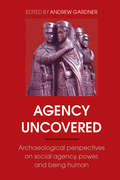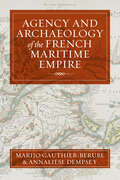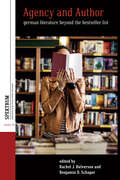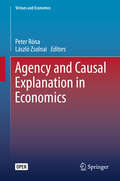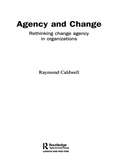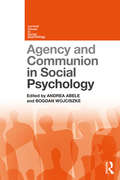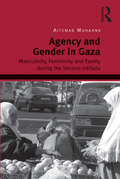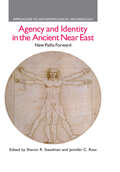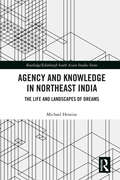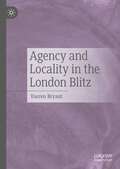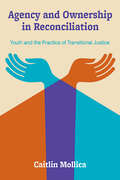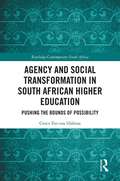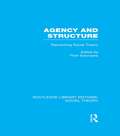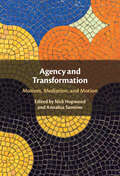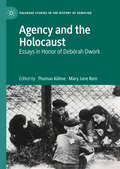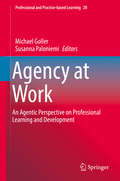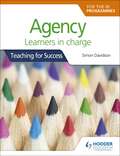- Table View
- List View
Agency Governance in the EU (ISSN)
by Berthold Rittberger and Arndt WonkaThe rapid proliferation of EU agencies represents one of the most significant changes to the EU’s organisational set-up in past decades. At the same time, this development has significantly affected regulatory policy-making in the EU.This volume assembles the most renowned scholars in the field to address the key themes and challenges that agency governance in the EU poses to effective and legitimate policy-making. The first theme addresses the causes and dynamics of the creation and design of regulatory bodies in EU governance, focusing not only on EU agencies but also on alternatives to the agency format, such as regulatory networks. Second, once agencies are established, the book goes on to explore the consequences and trajectories of agency governance. How effective and autonomous are EU agencies? How does EU agency governance transform existing patterns of executive governance in the EU? Third, the book addresses the design of EU agencies as independent, non-majoritarian institutions poses pressing questions with a view to their legitimacy and accountability.The volume appeals to scholars and practitioners interested in the development and transformation of executive governance in the EU.This book was published as a special issue of the Journal of European Public Policy.
Agency Implementation of Alternative Contracting Methods
by Transportation Research Board National Academies of Sciences, Engineering, and Medicine National Cooperative Highway Research Program Mounir El AsmarThe use of alternative contracting methods (ACMs) has accelerated the delivery of highway design and construction projects. Led by documented successes on large, high-profile projects such as I-15 in Utah, the Intercounty Connector in Maryland, and the Sellwood Bridge in Oregon, ACMs have resulted in shorter project delivery times with less disruption to the traveling public. The use of ACMs is becoming commonplace in projects by state departments of transportation, but not just for large projects. The information in this document builds on the three-volume NCHRP Research Report 939: Guidebooks for Post-Award Contract Administration for Highway Projects Delivered Using Alternative Contracting Methods. NCHRP Web-Only Document 421: Agency Implementation of Alternative Contracting Methods, from TRB's National Cooperative Highway Research Program, aims to ensure agencies have the practical methods and tools to improve their ACM contract administration.
Agency Mania: Harness The Madness of Client/Agency Relationships for High-Impact Results
by Bruno Gralpois Bob LiodiceAgency Mania was written because billions of dollars in company budgets are invested every year into marketing efforts that strive to deliver engaging consumer experiences and deliver measurable business results. To get most out of their marketing investment, brand advertisers of all sizes must demand more from their advertising and marketing communications agencies, and get the best possible work from these relationships while simultaneously driving the dual agenda of effectiveness and efficiency. Why do some client/agency partnerships thrive while others fail? And how can both parties improve the chances of success? Agency Mania is an indispensable guide in which, Bruno Gralpois reveals the anatomy of a strong partnership with an advertising, media, digital, PR or marketing communications agency that drives results and delivers real value to the client's business. Mr. Gralpois shines a bright light on the insanity of clients and agencies failing to effectively nurture their relations.
Agency Mania: Harnessing The Madness Of Client/agency Relationships For High-impact Results
by Bruno GralpoisWhy do some client/agency relationships thrive while others fail? At a time of unprecedented change and complexity in marketing and advertising, Agency Mania will transform the way you look at client/agency relationships and invite you to build sustained partnerships that deliver unmatched work and results. The world of marketing is a trillion-dollar industry and is changing at a drastic pace. The advertiser/agency relationship is under incredible pressure. Some may argue it’s even broken. The future of the advertising industry is uncertain. The entire marketing ecosystem is being tested. What will the agency of tomorrow look like? What competencies will agencies need to build? How will they deliver greater value to their clients? Similarly, how will advertisers reap the benefits agencies bring to their table? How will they become better clients? How will they set their partnerships up for success? In Agency Mania, partnership guru Bruno Gralpois demonstrates that these partnerships, once managed professionally, have remarkable transformational value and measurable business impact. The author shines a bright light on the insanity of advertisers and agencies failing to work optimally together or hold each other truly accountable. Building a successful long-term advertiser/agency partnership requires a robust set of competencies and operating principles.Agency Mania shows you step-by-step how it is done.
Agency Theory and Executive Pay: The Remuneration Committee's Dilemma
by Alexander PepperThis new book examines the relationship between agency theory and executive pay. It argues that while Jensen and Meckling (1976) were right in their analysis of the agency problem in public corporations they were wrong about the proposed solutions. Drawing on ideas from economics, psychology, sociology and the philosophy of science, the author explains how standard agency theory has contributed to the problem of executive pay rather than solved it. The book explores why companies should be regarded as real entities not legal fictions, how executive pay in public corporations can be conceptualised as a collective action problem and how behavioral science can help in the design of optimal incentive arrangements. An insightful and revolutionary read for those researching corporate governance, HRM and organisation theory, this useful book offers potential solutions to some of the problems with executive pay and the standard model of agency.
Agency Theory and Sustainability in the Global Supply Chain (Springerbriefs In Business)
by Emanuela DelbufaloThis book analyzes how and under what conditions collaborating corporations can effectively manage relationships with their suppliers in order to decrease the risk of suppliers’ noncompliance with codes of conduct and standards. In so doing, it represents an important addition to the management literature on corporate social responsibility in global supply chains – which is highly topical at a time when companies are increasingly aware of the social and environmental aspects of global sourcing. <P><P>After an opening systematic review of the literature on agency theory and supply chain management, it explores the rationale underlying collaboration among competitors, and the most critical aspects of such collaboration, in depth. Thanks to the book’s use of real-life examples, readers will learn how agency theory can help improve relationship management and address the major issues in sustainable global sourcing.
Agency Uncovered: Archaeological Perspectives on Social Agency, Power, and Being Human (UCL Institute of Archaeology Publications)
by Andrew GardnerThis book questions the value of the concept of 'agency', a term used in sociological and philosophical literature to refer to individual free will in archaeology. On the one hand it has been argued that previous generations of archaeologists, in explaining social change in terms of structural or environmental conditions, have lost sight of the 'real people' and reduced them to passive cultural pawns, on the other, introducing the concept of agency to counteract this can be said to perpetuate a modern, Western view of the autonomous individual who is free from social constraints. This book discusses the balance between these two opposites, using a range of archaeological and historical case studies, including European and Asian prehistory, classical Greece and Rome, the Inka and other Andean cultures. While focusing on the relevance of 'agency' theory to archaeological interpretation and using it to create more diverse and open-ended accounts of ancient cultures, the authors also address the contemporary political and ethical implications of what is essentially a debate about the definition of human nature.
Agency and Archaeology of the French Maritime Empire
by Marijo Gauthier-Bérubé and Annaliese DempseyThe French maritime empire enabled the continued colonization of territories all over the world from the 17th to the 19th centuries and was built upon the backs of those in lower socioeconomic classes. These classes were heavily impacted by social, political and economic structures. Detailed archaeological case studies using an agency perspective indicate that these lower socioeconomic classes were extremely diverse and dynamic groups that constantly negotiated their identities. These stories are not about the kings, military leaders, and politicians, but rather an exploration of the perspective of those who provided the fuel, both willingly and unwillingly, for the French maritime empire.
Agency and Author: German Literature Beyond the Bestseller List (Spektrum: Publications of the German Studies Association)
by Rachel J. Halverson Benjamin D. SchaperThe image of the solitary author devoting days and nights to writing endless bestselling novels remains an insidious and largely unchallenged myth within German culture. In this exacting examination of the German publishing industry, Agency and Author addresses the financial reality sometimes eclipsed by this idea. Focusing on lesser-known German-language writers and their interactions with the Literaturbetrieb (“literary scene”), Agency and Author explores the ways authors assert creative agency in an increasingly ‘eventized’ literary marketplace. Ranging from the impacts of literary awards to media hate campaigns, this volume spotlights how profoundly the German literary landscape and our understanding of authorship is transforming.
Agency and Causal Explanation in Economics (Virtues and Economics #5)
by László Zsolnai Peter RónaThis open access book provides an exploration of the consequences of the ontological differences between natural and social objects (sometimes described as objects of nature and objects of thought) in the workings of causal and agency relationships. One of its important and possibly original conclusions is that causal and agency relationships do not encompass all of the dependent relationships encountered in social life. The idea that social reality is contingent has been known (and largely undisputed) at least since Wittgenstein’s “On Certainty”, but social science, and most notably economics has continued to operate on the basis of causal and agency theories borrowed or adapted from the natural sciences. This volume contains essays that retain and justify the partial or qualified use of this approach and essays that totally reject any use of causal and agency theory built on determined facts (closed systems).The rejection is based on the possibly original claim that, whereas causation in the objects of the natural sciences reside in their properties, human action is a matter of intentionality. It engages with critical realist theory and re-examines the role of free will in theories of human action in general and economic theory in particular.
Agency and Change: Rethinking Change Agency in Organizations (Routledge Studies in Organizational Change & Development)
by Raymond CaldwellThis excellent book remaps the limits and possibilities of change, clearly shifting the focus from outmoded debates on agency and structure to new practice-based discourses on agency and change. Offering readers a selective and critical review of key literature and empirical research, it will help students contextualize this complex subject area and independently evaluate future prospects for effective change agent roles in organizations Presenting an interdisciplinary exploration of competing discourses, the book uses two overarching conceptual continua: centred agency-decentred agency and systems-processes, thereby allowing a more intensive focus on agency and change. Well-written with challenging content, this book is essential reading for those interested in the origins, development and future prospects for change agency in an organizational world characterized by increasing complexity, risk and uncertainty.
Agency and Communion in Social Psychology (Current Issues In Social Psychology Ser.)
by Bogdan Wojciszke Andrea E. AbeleWhat are the ultimate motives that instigate individuals’ behaviours? What are the aims of social perception? How can an individuals’ behaviour be described both from the perspective of the actor and from the perspective of an observer? These are the basic questions that this book addresses using its proposed agency-communion framework. Agency (competence, assertiveness) refers to existence of an organism as an individual, to "getting ahead" and to individual goal-pursuit; communion (warmth, morality) refers to participation of an individual in a larger organism, to "getting along" and to forming bonds. Each chapter is written by experts in the field and use the agency-communion framework to explore a wide variety of topics, such as stereotypes, self-esteem, personality, power, and politics. The reader will profit from the deep insights given by leading researchers. The variety of theoretical approaches and empirical contributions shows that the parsimonious and simple structure of two types of content in behavior, motives, personality, self-concept, stereotypes, and more to build an overarching frame to different phenomena studied in psychology.
Agency and Democracy in Development Ethics
by Lori Keleher Stacy J. KoskoA diverse set of expert voices from the Global North and South - philosophers, economists, policy and development scholars and practitioners - explore two themes central to development ethics: agency and democracy. Established luminaries in development ethics engage with the book's themes alongside fresh voices on the way to becoming familiar figures in the field. Their essays work within diverse areas of development studies, including human security and human rights, democratic governance in theory and practice, the capability approach, gender and development, and applied and theoretical critiques of the philosophical underpinnings of various accounts of development. The result is a varied and comprehensive discussion of current work in development ethics that significantly advances our understanding of theoretical and practical work of development. This book will interest students, scholars, and practitioners of global justice, human rights, international development and political philosophy.
Agency and Gender in Gaza: Masculinity, Femininity and Family during the Second Intifada
by Aitemad MuhannaDrawing on rich interview material and adopting a life history approach, this book examines the agency of women living in insecure and uncertain conflict situations. It explores the effects of the Israeli policy of closure against Gaza and the resulting humanitarian crisis in relation to gender relations and gender subjectivity. With attention to the changing roles of men in the household and community as a result of the loss of male employment, the author explores the extension of poor women’s mobility, particularly that of young wives with dependent children, for whom the meaning of agency has shifted from being providers in the domestic sphere to becoming publicly dependent on humanitarian aid. Without conflating women’s agency with resistance to patriarchy, Agency and Gender in Gaza extends the concept of agency to include its subjective and intersubjective elements, shedding light on the recent distortion of the traditional gender order and the reasons for which women resist the masculine power that they have acquired as a result. An empirically grounded examination of the attempt to maintain the meaning of social existence through the preservation of socially constructed images of masculinity and femininity, this book will be of interest to social scientists with interests in gender studies, masculinities and the sociology of the family.
Agency and Identity in the Ancient Near East: New Paths Forward (Approaches To Anthropological Archaeology Ser.)
by Jennifer C. Ross Sharon R. SteadmanAgency theory examines the relationship between individuals or groups when one party is doing work on behalf of another. 'Agency and Identity in the Ancient Near East' offers a theoretical study of agency and identity in Near Eastern archaeology, an area which until now has been largely ignored by archaeologists. The book explores how agency theory can be employed in reconstructing the meaning of spaces and material culture, how agency and identity intersect, and how the availability of a textual corpus may impact on the agency approach. Ranging from the Neolithic to the Islamic period, 'Agency and Identity in the Ancient Near East' covers sites located in Turkey, Iraq, Syria, Jordan, Palestine, and Israel. The volume includes contributions from philology, art, history, computer simulation studies, materials science, and the archaeology of settlement and architecture.
Agency and Knowledge in Northeast India: The Life and Landscapes of Dreams (Routledge/Edinburgh South Asian Studies Series)
by Michael HeneiseThe Nagas of Northeast India give great importance to dreams as sources of divine knowledge, especially knowledge about the future. Although British colonialism, Christian missions, and political conflict have resulted in sweeping cultural and political transformations in the Indo-Myanmar borderlands, dream sharing and interpretation remain important avenues for negotiating everyday uncertainty and unpredictability. This book explores the relationship between dreams and agency through ethnographic fieldwork among the Angami Nagas. It tackles questions such as: What is dreaming? What does it mean to say ‘I had a dream’? And how do night-time dreams relate to political and social actions in waking moments? Michael Heneise shows how the Angami glean knowledge from signs, gain insight from ancestors, and potentially obtain divine blessing. Advancing the notion that dreams and dreaming can be studied as indices of relational, devotional, and political subjectivities, the author demonstrates that their examination can illuminate the ways in which, as forms of authoritative knowledge, they influence daily life, and also how they figure in the negotiation of day-to-day domestic and public interactions. Moreover, dream narration itself can involve techniques of ‘interference’ in which the dreamer seeks to limit or encourage the powerful influence of social ‘others’ encountered in dreams, such as ancestors, spirits, or the divine. Based on extensive ethnographic research, this book advances research on dreams by conceptualising how the ‘social’ encompasses the broader, co-extensive set of relations and experiences - especially with spirit entities - reflected in the ethnography of dreams. It will be of interest to those studying Northeast India, indigenous religion and culture, indigenous cosmopolitics in tribal India more generally, and the anthropology of dreams and dreaming.
Agency and Locality in the London Blitz
by Darren BryantThis book takes a fresh approach to the London Blitz by viewing this time through individual local boroughs of the metropolis. The term ‘London Blitz’ means that culturally we have become accustomed to understanding that the actual blitz experience was the same wherever in the capital one happened to be, despite some areas being hit more than others. This book illustrates how there were many London blitzes, not one, influenced by a myriad of metropolitan localities, and giving rise to an agency of locality that helped to shape the lived blitz experience. By walking through the streets of London, this book conducts a local area analysis, witnessing the blitz through six London localities, representative of the assorted administrative, economic, and socio-political variables prevalent in wartime London. Covering air raids alongside topics like the provision of shelters, homelessness, and communal feeding, it shows how any history of the London Blitz must acknowledge that it was an experience reflective of a varied metropolis.
Agency and Ownership in Reconciliation: Youth and the Practice of Transitional Justice
by Caitlin MollicaThe importance of youth's substantive participation for the realization of inclusive reconciliation practices has rarely been acknowledged. Agency and Ownership in Reconciliation provides a comprehensive, nuanced, and empirical account of the contribution of young people's voices to the success of transitional justice and peacebuilding practices. Caitlin Mollica illustrates the role of political will and agency in the development of transitional justice mechanisms that are substantively inclusive of those traditionally marginalized by post-conflict institutions, most notably youth. In doing so, she highlights the importance of youth to lasting peace and meaningful justice. She does so by looking specifically at how truth and reconciliation commissions from South Africa to the Solomon Islands engage with the voices of youth and the meanings youth self-ascribe to their experiences during truth and reconciliation commission processes. In a field which traditionally prioritizes stories about youth, Agency and Ownership in Reconciliation looks to center stories by youth.
Agency and Social Transformation in South African Higher Education: Pushing the Bounds of Possibility (Routledge Contemporary South Africa)
by Grace Ese-osa IdahosaThis book explores the process of transformation, discussing how individuals are capable of acting to enable transformation of structures and cultures through the lens of South African higher education. Agency and Social Transformation in South African Higher Education examines the role of agency in effecting change amidst the rigid conditions within South African universities. Arguing for a focus on transformation from below, it explores transformation and agency from the perspective of academic staff. Through discussing moments at which faculty members embedded in rigid structures and cultures perceive themselves as having had the agency to interrupt and transform them, despite their rigidity, this book describes the nuances of social action and agency within the South African higher education institutional context and the ways in which contextual histories may provide enabling/limiting conditions to individuals within them. This book makes an important contribution to the field of agency and social transformation theoretically, methodologically and geographically as it details the motivations for transformation, how individuals become agents of change and the practical experiences of these individuals from a localised perspective. Agency and Social Transformation in South African Higher Education will be of interest to scholars and students of African higher education, transformation studies and postcolonial studies.
Agency and Structure: Reorienting Social Theory (Routledge Library Editions: Social Theory)
by Piotr SztompkaA striking feature of the human condition is its dual, contradictory, inherently split character; on the one hand, autonomy and freedom; on the other, constraint and dependence on social structure. This volume addresses this central problem of the linkage between human action and social structure in sociological and social science theory. Contributions cover several different approaches to the agency-structure problematic, and represent the work of a number of leading international sociologists. Their efforts point to a reorientation of social theory, both on philosophical and methodological levels.
Agency and the Holocaust: Essays in Honor of Debórah Dwork (Palgrave Studies in the History of Genocide)
by Thomas Kühne Mary Jane ReinThe book assembles case studies on the human dimension of the Holocaust as illuminated in the academic work of preeminent Holocaust scholar Deborah Dwork, the founding director of the Strassler Center for Holocaust and Genocide Studies, home of the first doctoral program focusing solely on the Holocaust and other genocides. Written by fourteen of her former doctoral students, its chapters explore how agency, a key category in recent Holocaust studies and the work of Dwork, works in a variety of different ‘small’ settings – such as a specific locale or region, an organization, or a group of individuals.
Agency at Work: An Agentic Perspective on Professional Learning and Development (Professional and Practice-based Learning #20)
by Michael Goller Susanna PaloniemiMichael Goller gives a structured overview of the current discourses of human agency in relation to professional learning and development. Based on this discussion, the author develops a theoretical framework including human agency as an individual feature (i. e. , a disposition) as well as a set of self-initiated and goal-directed behaviours that are assumed to affect employees' learning and development (e. g. , crafting of new work experiences). He then further specifies this theoretical framework and investigates it empirically in the domain of geriatric care nursing. Based on the findings of the three empirical studies conducted, the author discusses the relevance of human agency for the development of professional expertise of geriatric care nurses.
Agency for the IB Programmes: For PYP, MYP, DP & CP: Learners in charge (Teaching for Success)
by Simon DavidsonTeach for success and implement effective strategies to develop a learning community that supports student agency and self-efficacy with this essential guide developed by an experienced PYP educator. - Create opportunities for agency in the classroom with guidance and advice that focusses on the three agency strands: choice, voice and ownership.-Explore the skills of being a learner and how to build these to enable students to influence and direct their own learning. - Discover the role of play in learning with a dedicated chapter looking at the characteristics of play, why it is important and how it can develop understanding in learners of all ages.-Agency is not just about the student - everyone is an agentic learner, even teachers. Learn how to change your growth mindset and become agentic learners too.
Agency for the IB Programmes: For PYP, MYP, DP & CP: Learners in charge (Teaching for Success)
by Simon DavidsonTeach for success and implement effective strategies to develop a learning community that supports student agency and self-efficacy with this essential guide developed by an experienced PYP educator. - Create opportunities for agency in the classroom with guidance and advice that focusses on the three agency strands: choice, voice and ownership.-Explore the skills of being a learner and how to build these to enable students to influence and direct their own learning. - Discover the role of play in learning with a dedicated chapter looking at the characteristics of play, why it is important and how it can develop understanding in learners of all ages.-Agency is not just about the student - everyone is an agentic learner, even teachers. Learn how to change your growth mindset and become agentic learners too.
